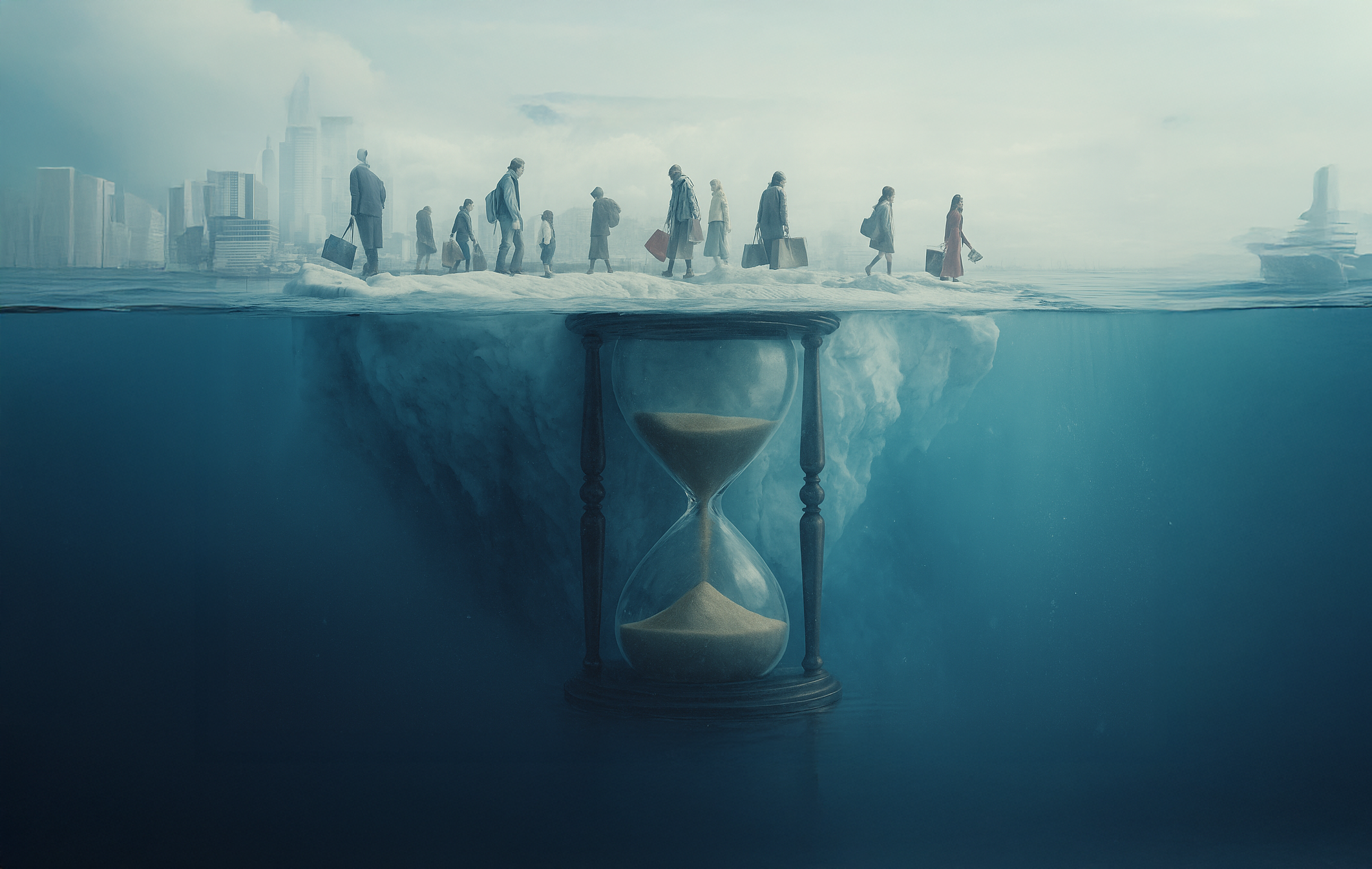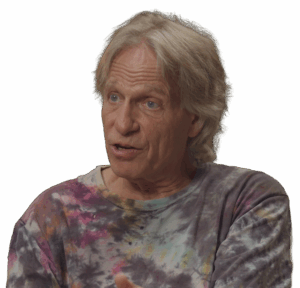
Ep 199 | Sheldon Solomon
Terror Management Theory: How Existential Dread Has Shaped the World
Description
Many of us wrestle with the unsettling truth that everyone – including ourselves and those we love – will one day die. Though this awareness is uncomfortable, research suggests that the human capacity to contemplate death is a byproduct of consciousness itself. In fact, our efforts to cope with mortality are at the core of culture, religion, the desire for wealth, and even many of today’s societal crises. How might a deeper understanding of our implicit reactions to mortality help us turn towards responses that are more supportive of our species and planet?
In this episode, Nate is joined by Sheldon Solomon, a psychologist and co-developer of Terror Management Theory, which posits that while all living beings strive to survive, humans are unique in knowing that death is unavoidable. Solomon explores some of our instinctual coping mechanisms, including clinging to existing cultural worldviews and activities that bolster our self-esteem, even when they may have negative consequences for those around us. He also explains how these defensive mechanisms manifest in modern society, influencing politics, consumerism, and religious beliefs.
Why does our fear of death drive materialism and the endless hunger for “more”? How do reminders of death impact our attitudes toward people with different political or religious beliefs? And lastly, could practices rooted in mindfulness, gratitude, and awe help us to more skillfully relate to death anxiety by strengthening our relationships, giving to our community, and reveling in the expansive magnificence of the universe in which we get to inhabit?
About Sheldon Solomon
Sheldon Solomon is Professor of Psychology at Skidmore College. His research on the behavioral effects of the unique human awareness of death have been supported by the National Science Foundation and the Ernest Becker Foundation, and were featured in the award winning documentary film Flight from Death: The Quest for Immortality.
Sheldon is the co-author of the book In the Wake of 9/11: The Psychology of Terror and The Worm at the Core: On the Role of Death in Life. Additionally, he is an American Psychological Society Fellow, as well as a recipient of an American Psychological Association Presidential Citation (2007) and a Lifetime Career Award by the International Society for Self and Identity (2009).
In French, we have a motto that says that a simple drawing is often better than a long explanation. Jean-Marc Jancovici Carbone 4 President
That’s very understandable because with left atmosphere thinking, one of the problems is that you see everything as a series of problems that must have solutions. Iain McGilchrist Neuroscientist and Philosopher
We can’t have hundreds and hundreds of real relationships that are healthy because that requires time and effort and full attention and awareness of being in real relationship and conversation with the other human. Nate Hagens Director of ISEOF
This is the crux of the whole problem. Individual parts of nature are more valuable than the biocomplexity of nature. Thomas Crowther Founder Restor
Show Notes & Links to Learn More
Download transcriptThe TGS team puts together these brief references and show notes for the learning and convenience of our listeners. However, most of the points made in episodes hold more nuance than one link can address, and we encourage you to dig deeper into any of these topics and come to your own informed conclusions.
00:00 – Sheldon Solomon, Scholarly works, Academic Vita, The Worm at the Core, In the Wake of 9/11
00:48 – Terror Management Theory (TMT) (More info), Co-Developers: Jeff Greenberg & Thomas Pyszczynski
03:20 – Ernest Becker (The Birth and Death of Meaning, Denial of Death, Escape from Evil)
04:07 – Darwinian assumption that all organisms are predisposed to self-preservation
05:10 – Humans are uber-social creatures, we are very smart, and we’re great at imagining things
06:15 – Soren Kierkegaard, Fear and Trembling, awe and dread
09:05 – Existential Terror/Postulations
09:10 – Psychological Equanimity
09:39 – Cultural Worldview (Becker and TMT)
10:00 – Every culture has a story of the origin of the universe, how we ought to behave, and promise of immortality in order to create meaning
11:00 – Becker’s definition of self-esteem
12:50 – Becker’s Pulitzer Prize
13:20 – Becker’s Freudian influence
14:16 – Ajit Varki, MORT Theory
15:08 – Denial – Ajit Varki and Danny Brower
17:11 – Debate on whether humans are the only creatures with consciousness and awareness of death
19:10 – The Child’s Discovery Of Death: A Study in Child Psychology by Sylvia Anthony
20:18 – Immortality by Stephen Cave
21:15 – Darwin’s study of earthworms and death as a part of the cycle of life
22:11 – We all develop unique perceptions of the reality around us
22:15 – Etymology of ‘consciousness’
22:21 – Heidegger’s concept of “Thrownness,” Ernest Becker on meaning through culture
24:25 – Ernest Becker: history is a succession of immortality ideologies
24:55 – Ancient burial sites and beliefs in the afterlife
25:35 – Monotheistic religions, Gilgamesh
25:54 – Terracotta warrior burials, Pyramid burials with boat graves
26:10 – People who freeze their head for immortality, Striving to upload minds to ‘the cloud’
26:44 – Juan Ponce de León
27:32 – Oswald Spengler, The Decline of the West
27:38 – Friedrich Nietzsche
28:48 – The Gay Science, “God is dead” full quote
29:51 – Ricky Gervais: “I believe in one less God”
30:38 – Etymology of ‘religion’
30:42 – Emile Durkheim – The Elementary Forms of the Religious Life
31:08 – Religion’s role in life
35:52 – Sarah E. Wolfe, Mortality salience, Mortality prime
36:40 – Jodi Wellman – How the Contemplation of Death Can Lead to Meaning in Life
39:28 – Liberal vs. conservative reactions to death reminders
39:45 – Meaning of conservative and liberal
40:32 – Political orientation is largely a genetic inheritance
41:49 – Global Heating impacts, Pandemics, Economic instability, Escalating armed conflict, Global shift from democracy to fascism
43:05 – President Trump declaration that climate change is a hoax
43:15 – Eve Darian Smith, Global Burning
43:55 – Mussolini definition of fascism and corporatism
44:32 – Denial of Death on Hitler – Chapter 7
44:50 – Max Weber, Weber on charismatic authority
45:07 – Heightened concerns about mortality should intensify the appeal of charismatic leaders, Additional study, Additional study
45:37 – President George W. Bush approval ratings pre- and post- 9/11
47:20 – Psychological view on fascism
48:43 – Steve Bannon, Jennifer Kavanaugh and Michael D. Rich – Truth Decay
49:15 – Misinformation thrives on emotional triggers
49:40 – Short history of global living conditions by multiple metrics
50:45 – Peter Turchin, Peter Turchin on TGS, 2010 prediction on American collapse
52:10 – Immiseration causing shorter humans and shorter life expectancy
53:02 – Facism is a far-right ideology
53:24 – The New Deal to the Reagan Era
54:13 – Income inequality is increasing
54:50 – “Woke”
55:40 – Gallup* study on American’s satisfaction with U.S. by party ID
56:30 – Peter Turchin on Cliodynamics
57:38 – American propaganda comparable to Hiter and Putin
57:55 – Social media does not provide unbiased content
58:10 – Very few Americans read newspapers or even read at all, Some* get their news from social media
58:35 – Fox News reliability vs. MSNBC Reliability
59:20 – Mortality salience and prosocial behavior increase
1:01:05 – Albert Camus quote on death, Socrates on philosophy and death
1:01:45 – Mindfulness
1:03:10 – Mindfulness and mortality salience
1:03:45 – Aristotle on flourishing
1:04:45 – Otto Rank: we are a “temporal representative of the cosmic primal force”
1:06:08 – Death awareness acceptance changes the neurons
1:06:37 – Psychedelics and fear of death, Timothy Leary, Stanislav Grof
1:10:48 – Experiential appreciation
1:14:07 – Mortality salience and desire for offspring
1:16:15 – Bill Plotkin on TGS (Eco-Awakening), Mark Gafni on post-tragic
1:16:55 – Mammalian species lifespan is 1-2 million years
1:19:20 – Greed
1:20:00 – Death reminders make us more willing to destroy environment
1:21:10 – Money and death anxiety study, Additional study
1:25:28 – Origin of humans, Humans are more genetically related to each other than 2 monkeys
1:26:40 – Genesis story, Alternative interpretations to dominion
1:27:35 – Bob Marley – Get Up, Stand Up
1:27:45 – Saint Francis of Assisi on creation
1:28:45 – Mortality reminders lead to giving
1:29:20 – Frankly on the Median Human, TGS Roundtable on Psychopathy, TGS Episode on human origins of surplus
1:33:15 – Braiding Sweetgrass, Linear vs. Circular/Cyclical time
1:34:12 – The Dawn of Everything overview
1:36:25 – Nature exposure and health, Informal social acknowledgement is psychologically uplifting
1:37:50 – Re-engage in communal rituals
1:39:40 – The Black Plague (Evolution of causes), The Plague by Albert Camus (quote on mankind)
1:40:35 – Robert Jay Lifton – we could be the first species responsible for our own extinction
1:44:40 – Average American can’t name the branches of government, Separation of powers







